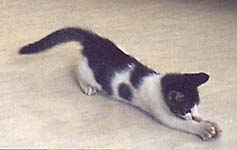



|
Koreans generally don't much care for cats. For the first several months she taught
in Korea, Margaret saw only stray cats, no pets. Koreans think cats spread disease. They also have some pretty dark superstitions about cats and spirits. Adults tend to be a little edgy around them. They're afraid of the claws and won't look into their eyes. If you adopt a cat while you're in Korea, I say bravo for you, but don't be too surprised if your Korean friends visit you less after that. You'll also find that cat food and kitty litter are harder to find and more expensive than you're used to, and some of the vets aren't really set up to treat cats. Margaret got one anyway. She bought this kitten from a street vendor, who had him tied up in a mesh bag, destined for who knows what if someone else had bought him. One of her more cat-friendly Korean friends told her that Nabi is a fairly common name for cats. It means "butterfly." So that's who he is. He still lives with us today. Margaret bought him a ticket, and he braved the 24 hour flight back to the US. A couple of paragraphs ago, I mentioned how Korean adults react to cats. The kids are completely different. It wasn't long before Margaret's apartment became a neighborhood cat and kid center. I'm not sure how much Nabi appreciated it, but the kids certainly had fun playing with him. Maybe it's partly that the younger generations have more western ideas, but it seems that Korean ideas about cats are mellowing. In recent years we've seen more cats in Korea, and they don't look quite so desperately furtive.
|